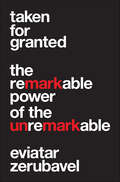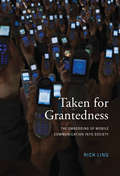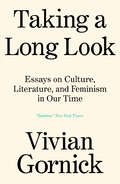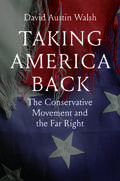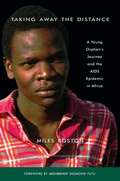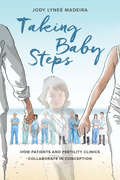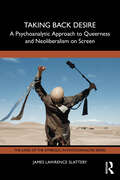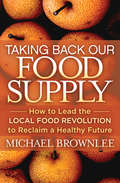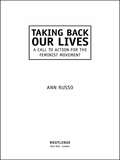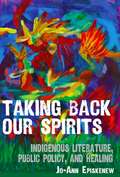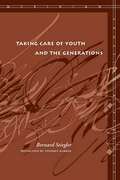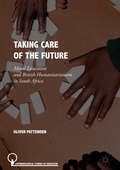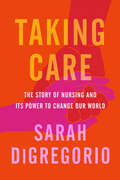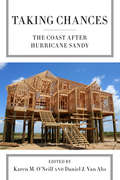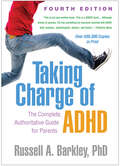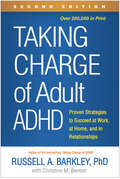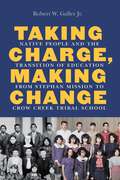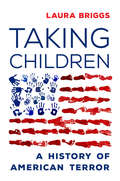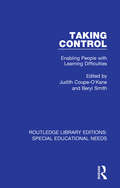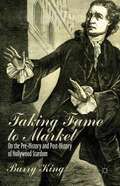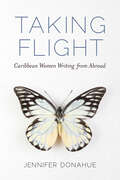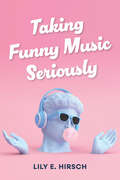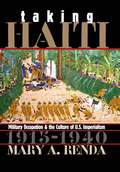- Table View
- List View
Taken for Granted: The Remarkable Power of the Unremarkable (WILDGuides)
by Eviatar ZerubavelHow the words we use—and don’t use—reinforce dominant cultural normsWhy is the term "openly gay" so widely used but "openly straight" is not? What are the unspoken assumptions behind terms like "male nurse," "working mom," and "white trash"? Offering a revealing and provocative look at the word choices we make every day without even realizing it, Taken for Granted exposes the subtly encoded ways we talk about race, gender, sexual orientation, religion, social status, and more.In this engaging and insightful book, Eviatar Zerubavel describes how the words we use--such as when we mark "the best female basketball player" but leave her male counterpart unmarked—provide telling clues about the things many of us take for granted. By marking "women's history" or "Black History Month," we are also reinforcing the apparent normality of the history of white men. When we mark something as being special or somehow noticeable, that which goes unmarked—such as maleness, whiteness, straightness, and able-bodiedness—is assumed to be ordinary by default. Zerubavel shows how this tacit normalizing of certain identities, practices, and ideas helps to maintain their cultural dominance—including the power to dictate what others take for granted.A little book about a very big idea, Taken for Granted draws our attention to what we implicitly assume to be normal—and in the process unsettles the very notion of normality.
Taken for Grantedness: The Embedding of Mobile Communication into Society (The\mit Press Ser.)
by Richard LingAn examination of how the mobile phone has become part of the fabric of society—as did such earlier technologies as the clock and the car.Why do we feel insulted or exasperated when our friends and family don't answer their mobile phones? If the Internet has allowed us to broaden our social world into a virtual friend-net, the mobile phone is an instrument of a more intimate social sphere. The mobile phone provides a taken-for-granted link to the people to whom we are closest; when we are without it, social and domestic disarray may result. In just a few years, the mobile phone has become central to the functioning of society. In this book, Rich Ling explores the process by which the mobile phone has become embedded in society, comparing it to earlier technologies that changed the character of our social interaction and, along the way, became taken for granted.Ling, drawing on research, interviews, and quantitative material, shows how the mobile phone (and the clock and the automobile before it) can be regarded as a social mediation technology, with a critical mass of users, a supporting ideology, changes in the social ecology, and a web of mutual expectations regarding use. By examining the similarities and synergies among these three technologies, Ling sheds a more general light on how technical systems become embedded in society and how they support social interaction within the closest sphere of friends and family.
Taking A Long Look: Essays on Culture, Literature and Feminism in Our Time
by Vivian GornickOne of our most vital and incisive writers on literature, feminism, and knowing one's selfFor nearly fifty years, Vivian Gornick's essays, written with her characteristic clarity of perception and vibrant prose, have explored feminism and writing, literature and culture, politics and personal experience. Drawing writing from the course of her career, Taking a Long Look illuminates one of the driving themes behind Gornick's work: that the painful process of understanding one's self is what binds us to the larger world.In these essays, Gornick explores the lives and literature of Alfred Kazin, Mary McCarthy, Diana Trilling, Philip Roth, Joan Didion, and Herman Melville; the cultural impact of Silent Spring and Uncle Tom's Cabin; and the characters you might only find in a New York barber shop or midtown bus terminal. Even more, Taking a Long Look brings back into print her incendiary essays, first published in the Village Voice, championing the emergence of the women's liberation movement of the 1970s.Alternately crackling with urgency or lucid with insight, the essays in Taking a Long Look demonstrate one of America's most beloved critics at her best.
Taking America Back: The Conservative Movement and the Far Right
by David Austin WalshA provocative look at the relationship between the far right and the American conservative movement from the 1930s to the end of the Cold War Since 2016, many commentators have expressed shock at the so-called rise of the far right in America at the expense of "responsible" and "respectable" conservatism. But is the far right an aberration in conservative politics? As David Austin Walsh shows, the mainstream conservative movement and the far right have been intertwined for nearly a century, and both were born out of a "right-wing popular front" linking racists, anti-Semites, and fascists in a broad coalition opposed to socialism, communism, and New Deal liberalism. Far from being outliers in the broader conservative coalition, these extremist elements were foundational in the creation of a right‑wing political culture centered around shared political enemies, a penchant for conspiracy theories, and a desire to restore America to its "authentic" pre–New Deal values. The popular front included Merwin Hart, a New York business lobbyist active in far-right circles who became a lobbyist for the Franco regime in Spain, the original "America First" movement, the movement to prevent Jewish immigration to the United States after World War II, the John Birch Society, the American Nazi Party, the George Wallace presidential campaign of 1968, the fight over the National Endowment for the Humanities, and Pat Buchanan’s support of Nazi war criminal John Demjanjuk during the Reagan Administration. And connecting this disparate coalition was William F. Buckley, Jr., the editor of National Review and America’s leading "responsible conservative.&rdquo
Taking Away the Distance: A Young Orphan's Journey and the AIDS Epidemic in Africa
by Miles RostonIn this emotional story of hope and inspiration, an African boy, orphaned by AIDS becomes a catalyst for AIDS orphans worldwide. Living in a shantytown in Kenya, Kevin Sumba's life was one of loneliness and hardship. Yet he was determined to get an education. Miles Roston, a documentary filmmaker, first met Kevin while making a film on AIDS orphans. He found that this particular boy touched his heart in a way he hadn't anticipated. Together, they set out to answer "Kevin's Questions" about the AIDS epidemic and more specifically, Kevin's situation. Taking Away the Distance takes us on a singular journey, as powerful policymakers and those working at a grassroots level deal with the direct, and at times confronting, questions of one boy. Along the way, we also meet people directly impacted by the epidemic and face their lives heroically: from children surviving homelessness on Nairobi's streets to a mother on her deathbed whose only thought is how to care for the children she will leave behind. As Kevin and Roston form a bond of love and respect, each learning from the other, we discover just how much our own lives can change if we dare to help.
Taking Baby Steps: How Patients and Fertility Clinics Collaborate in Conception
by Jody Lyneé MadeiraIn Taking Baby Steps, Jody Lyneé Madeira takes readers inside the infertility experience, from dealing with infertility-related emotions to forming treatment relationships with medical professionals and confronting difficult medical decisions. Based on hundreds of interviews, this book investigates how women, men, and medical professionals negotiate infertility’s rocky terrain to create life and build families—a journey across personal, medical, legal, and ethical minefields that can test mental and physical health, friendships and marriages, spirituality, and financial security.
Taking Back Desire: A Psychoanalytic Approach to Queerness and Neoliberalism on Screen (The Lines of the Symbolic in Psychoanalysis Series)
by James Lawrence SlatteryTaking Back Desire studies film, television and video art texts through a Lacanian prism to restore a sense of queer as troubling identity and resistance to neoliberal forms of inclusion.James Lawrence Slattery illuminates how the framing of desire, identity, enjoyment, resistance and knowledge contribute to the investment in neoliberal formations of being and success, despite the corrosive effects neoliberalism has had for much of society. The book does not read queerness on screen as a discernible group of characters or narrative formulas, but as a point that meaning fails in the visual and temporal field. Examining the interrelation of the real, the imaginary, and the symbolic in contemporary politics and contemporary media, Slattery investigates how a diverse selection of moving image texts forge queerness as a relationship to the lack, while crucially resisting the creation of a new or definitive ‘canon’.Taking Back Desire will be essential reading for academics and scholars of Freudian and Lacanian psychoanalysis, queer theory, late capitalism, film, television and media studies, sexuality studies, critical race theory, cultural studies and feminist theory.
Taking Back Our Food Supply: How to Lead the Local Food Revolution to Reclaim a Healthy Future
by Michael BrownleeSeven steps you can take NOW to ignite a local food revolution and help reverse the devastation of the industrial food system! Our food supply has been hijacked by an unholy alliance of multinational corporations in big agriculture, big food, and big pharma. This industrial food complex is destroying our natural food supply, making us less healthy, and rapidly destroying the biosphere. Restoring food sovereignty and security is one of the most important causes of our time—requiring nothing less than a grassroots revolution. In Taking Back Our Food Supply, Michael Brownlee shows readers how to master the seven steps of building a resilient regional foodshed and illustrates how to ignite the local food revolution in their community to a radically increased impact, effectiveness, and scale.
Taking Back Our Lives: A Call to Action for the Feminist Movement
by Ann RussoFirst published in 2001. Routledge is an imprint of Taylor & Francis, an informa company.
Taking Back Our Spirits: Indigenous Literature, Public Policy, and Healing
by Jo-Ann EpiskenewFrom the earliest settler policies to deal with the “Indian problem,” to contemporary government-run programs ostensibly designed to help Indigenous people, public policy has played a major role in creating the historical trauma that so greatly impacts the lives of Canada’s Aboriginal peoples. Taking Back Our Spirits traces the link between Canadian public policies, the injuries they have inflicted on Indigenous people, and Indigenous literature’s ability to heal individuals and communities. Episkenew examines contemporary autobiography, fiction, and drama to reveal how these texts respond to and critique public policy, and how literature functions as “medicine” to help cure the colonial contagion.
Taking Care Of Youth And The Generations
by Bernard StieglerTaking Care exposes the carelessness of these industries and urges the reader to re-enter the "battle for intelligence" against the drive-oriented culture of short-term ("short-circuited") attention characteristic of the negative aspects of the new technologies.
Taking Care of Your Child
by Robert H. Fries James F. Vickery Donald M. PantellOver a million and a half families already use Taking Care of Your Child to help keep their children healthy. Updated with the most recent research and recommendations, this award-winning guide discusses common medical problems, as well as emotional issues such as new siblings and school challenges. The authors even provide forms for medical, growth, and immunization records. And unlike other children's health books, this comprehensive guide is useful from birth through a child's adolescence. Taking Care of Your Child is easy to use, even in a crisis. Simply look up a symptom, and you find a complete explanation of probable causes, how serious they are, and how you might quickly relieve your child's problem at home. Easy-to-follow decision charts show parents exactly when to take a child to see a doctor. This book covers more than 100 common complaints-injuries and allergies, childhood diseases-with especially clear advice on handling emergencies.
Taking Care of the Future: Moral Education And British Humanitarianism In South Africa (Anthropological Studies Of Education Ser.)
by Oliver PattendenTaking Care of the Future examines the moral dimensions and transformative capacities of education and humanitarianism through an intimate portrayal of learners, volunteers, donors, and educators at a special needs school in South Africa and a partnering UK-based charity. Drawing on his professional experience of “inclusive education” in London, Oliver Pattenden investigates how systems of schooling regularly exclude and mishandle marginalized populations, particularly exploring how “street kids” and poverty-afflicted young South Africans experience these dynamics as they attempt to fashion their futures. By unpacking the ethical terrains of fundraising, voluntourism, Christian benevolence, human rights, colonial legacies, and the post-apartheid transition, Pattenden analyzes how political, economic and social aspects of intervention materialize to transform the lives of all those involved.
Taking Care: The Story of Nursing and Its Power to Change Our World
by Sarah DiGregorioIn this sweeping cultural history of nursing from the Stone Age to the present, the critically acclaimed author of Early pays homage to the profession and makes an urgent call for change. Nurses have always been vital to human existence. A nurse was likely there when you were born and a nurse might well be there when you die. Familiar in hospitals and doctors’ offices, these dedicated health professionals can also be found in schools, prisons, and people’s homes; at summer camps; on cruise ships, and even at NASA. Yet despite being celebrated during the Covid-19 epidemic, nurses are often undermined and undervalued in ways that reflect misogyny and racism, and that extend to their working conditions—and affect the care available to everyone. But the potential power of nursing to create a healthier, more just world endures.The story of nursing is complicated. It is woven into war, plague, religion, the economy, and our individual lives in myriad ways. In Taking Care, journalist Sarah DiGregorio chronicles the lives of nurses past and tells the stories of those today—caregivers at the vital intersection of health care and community who are actively changing the world, often invisibly. An absorbing and empathetic work that combines storytelling with nuanced reporting, Taking Care examines how we have always tried to care for each other—the incredible ways we have succeeded and the ways in which we have failed. Fascinating, empowering and significant, it is a call for change and a love letter to the nurses of yesterday, today, and tomorrow.
Taking Chances: The Coast after Hurricane Sandy
by Joanna Burger Tammy L. Lewis Kenneth A. Gould Robert B. Gramling Mark Alan Hewitt Mariana Leckner Bonnie Mccay Briavel Holcomb Angela Oberg Melanie Mcdermott Steven G. Decker Professor Karen M. O'Neill Patricia M. Clay Daniel Redlaswk Frank A. Felder Clinton J. Andrews Adelle Thomas Lisa L. Colburn Larry Niles Daniel Baldwin Hess David A. Robinson Brian W. Conley James K. Mitchell Ashley Koning Shankar Chandramowli Daniel J. Van Abs Julia FlaggHumanity is deeply committed to living along the world's shores, but a catastrophic storm like Sandy--which took hundreds of lives and caused many billions of dollars in damages--shines a bright light at how costly and vulnerable life on a shoreline can be. Taking Chances offers a wide-ranging exploration of the diverse challenges of Sandy and asks if this massive event will really change how coastal living and development is managed. Bringing together leading researchers--including biologists, urban planners, utilities experts, and climatologists, among others--Taking Chances illuminates reactions to the dangers revealed by Sandy. Focusing on New Jersey, New York, and other hard-hit areas, the contributors explore whether Hurricane Sandy has indeed transformed our perceptions of coastal hazards, if we have made radically new plans in response to Sandy, and what we think should be done over the long run to improve coastal resilience. Surprisingly, one essay notes that while a large majority of New Jerseyans identified Sandy with climate change and favored carefully assessing the likelihood of damage from future storms before rebuilding the Shore, their political leaders quickly poured millions into reconstruction. Indeed, much here is disquieting. One contributor points out that investors scared off from further investments on the shore are quickly replaced by new investors, sustaining or increasing the overall human exposure to risk. Likewise, a study of the Gowanus Canal area of Brooklyn shows that, even after Sandy swamped the area with toxic flood waters, plans to convert abandoned industrial lots around the canal into high-density condominiums went on undeterred. By contrast, utilities, emergency officials, and others who routinely make long-term plans have changed operations in response to the storm, and provide examples of adaptation in the face of climate change. Will Sandy be a tipping point in coastal policy debates--or simply dismissed as a once-in-a-century anomaly? This thought-provoking collection of essays in Taking Chances makes an important contribution to this debate.
Taking Charge of ADHD, Fourth Edition: The Complete, Authoritative Guide for Parents
by Russell A. BarkleyThe leading parent resource about attention-deficit/hyperactivity disorder (ADHD) and its treatment has now been revised and updated with the latest information and resources. Prominent authority Russell A. Barkley compassionately guides you to: *Understand why kids with ADHD act the way they do. *Get an accurate diagnosis. *Work with school and health care professionals to find needed support. *Implement a proven eight-step behavior management plan. *Build your child's academic and social skills. *Restore harmony at home. New to the fourth edition are a chapter on health risks associated with ADHD, the latest information on the causes of the disorder, current facts on medications, a new discussion of sibling issues, advice for parents who might have ADHD themselves, downloadable practical tools, and much more.
Taking Charge of Adult ADHD: Proven Strategies to Succeed at Work, at Home, and in Relationships
by Russell A. BarkleyIf you're among the millions of adults with attention-deficit/hyperactivity disorder (ADHD), you need the latest facts about the disorder and its treatment. You need practical strategies to help develop your strengths and achieve your goals, whether on the job, in family relationships, or in personal pursuits. From renowned ADHD researcher/clinician Russell A. Barkley, this is the book for you. Dr. Barkley takes you through the process of seeking professional help, addresses frequently asked questions about medications and other treatments, and offers a wealth of advice and tips--all science-based. Featuring the latest resources and medication facts, the revised and updated second edition includes new or expanded discussions of mindfulness, emotional self-control, time management, building a successful career, maintaining a healthy lifestyle, and more. Finally, an authoritative one-stop resource to help you take back your life from ADHD. Mental health professionals, see also Cognitive-Behavioral Therapy for Adult ADHD: Targeting Executive Dysfunction, by Mary V. Solanto.
Taking Charge, Making Change: Native People and the Transition of Education from Stephan Mission to Crow Creek Tribal School (Indigenous Education)
by Robert W. Galler Jr.Taking Charge, Making Change gives voice to generations of Native people—from Crow Creek, Lower Brule, and other reservations in North Dakota and South Dakota—who shaped a school originally designed to foster Catholicism and assimilation. Local initiatives and collaboration transformed the Catholic Stephan Mission boarding school into the Crow Creek Tribal School, which now features both tribal traditions and American educational programs. Through archival research and interviews with parents, graduates, teachers, and staff at Crow Creek and the surrounding community, Robert W. Galler Jr. places Native students at the heart of the narrative, demonstrating multifaceted family connections at a nineteenth-century, on-reservation religious school that evolved into a tribally run institution in the 1970s. He shows numerous ways that community members worked with Catholic leaders and ultimately transformed their mindsets and educational approaches over nearly a century. While recognizing the many challenges and tragedies that Native students endured, Galler highlights the creativity, collaborations, and contributions of the students and graduates to their communities.Taking Charge, Making Change shows how individuals and families helped to found the school, maintain enrollment, secure funding, and influence school policies. Its graduates went on to serve with distinction in the U.S. military, earn advanced degrees after college, join and lead tribal councils in North and South Dakota, help their communities push back against federal policies, and continue to run their own education system.
Taking Children: A History of American Terror
by Laura Briggs"You have to take the children away."—Donald Trump Taking Children argues that for four hundred years the United States has taken children for political ends. Black children, Native children, Latinx children, and the children of the poor have all been seized from their kin and caregivers. As Laura Briggs’s sweeping narrative shows, the practice played out on the auction block, in the boarding schools designed to pacify the Native American population, in the foster care system used to put down the Black freedom movement, in the US’s anti-Communist coups in Central America, and in the moral panic about "crack babies." In chilling detail we see how Central Americans were made into a population that could be stripped of their children and how every US administration beginning with Reagan has put children of immigrants and refugees in detention camps. Yet these tactics of terror have encountered opposition from every generation, and Briggs challenges us to stand and resist in this powerful corrective to American history.
Taking Control: Enabling People with Learning Difficulties (Routledge Library Editions: Special Educational Needs #12)
by Judith Coupe-O’Kane Beryl SmithFirst published in 1994. This book pays tribute to the many parents and professionals who work and live with people who have learning difficulties. Enabling people with learning difficulties to take control may be achieved in a number of ways, ranging from systematic application of theory in programmes of learning and development, to a largely intuitive response. The Editors hope that the issues and reflections raised in this book will inspire all practitioners to continue to adopt an enquiring attitude towards ways in which people with learning difficulties can exert effective control over the operation of their lives.
Taking Fame to Market
by Barry KingThis book explores, from a sociological perspective, the relationship between acting as symbolic work and the commercialization of popular culture. Particular attention is paid to the social conditions that gave rise to stardom in the theatre and cinema, and how shifts in the marketing of stars have impacted upon contemporary celebrity culture.
Taking Flight: Caribbean Women Writing from Abroad (Caribbean Studies Series)
by Jennifer DonahueCaribbean women have long utilized the medium of fiction to break the pervasive silence surrounding abuse and exploitation. Contemporary works by such authors as Tiphanie Yanique and Nicole Dennis-Benn illustrate the deep-rooted consequences of trauma based on gender, sexuality, and race, and trace the steps that women take to find safer ground from oppression. Taking Flight examines the immigrant experience in contemporary Caribbean women’s writing and considers the effects of restrictive social mores. In the texts examined in Taking Flight, culturally sanctioned violence impacts the ability of female characters to be at home in their bodies or in the spaces they inhabit. The works draw attention to the historic racialization and sexualization of black women’s bodies and continue the legacy of narrating black women’s long-standing contestation of systems of oppression. Arguing that there is a clear link between trauma, shame, and migration, with trauma serving as a precursor to the protagonists’ emigration, Jennifer Donahue focuses on how female bodies are policed; how moral, racial, and sexual codes are linked; and how the enforcement of social norms can function as a form of trauma. Donahue considers the relationship between trauma, shame, and sexual politics and investigates how shame works as a social regulator that frequently leads to withdrawal or avoidant behaviors in those who violate socially sanctioned mores. Most importantly, Taking Flight positions flight as a powerful counter to disempowerment and considers how flight, whether through dissociation or migration, functions as a form of resistance.
Taking Funny Music Seriously (Comedy & Culture)
by Lily E. HirschTake funny music seriously! Though often dismissed as silly or derivative, funny music, Lily E. Hirsch argues, is incredibly creative and dynamic, serving multiple aims from the celebratory to the rebellious, the entertaining to the mentally uplifting. Music can be a rich site for humor, with so many opportunities that are ripe for a comedic left turn. Taking Funny Music Seriously includes original interviews with some of the best musical humorists, such as Tom Lehrer, "the J. D. Salinger of musical satire"; Peter Schickele, who performed as the invented composer P. D. Q. Bach, the supposed lost son of the great J. S. Bach; Kate Micucci and Riki Lindhome of the funny music duo Garfunkel and Oates; comedic film composer Theodore Shapiro; Too Slim of the country group Riders in the Sky; and musical comedian Jessica McKenna, from the podcast Off Book, part of a long line of "funny girls." With their help, Taking Funny Music Seriously examines comedy from a variety of genres and musical contexts—from bad singing to rap, classical music to country, Broadway music to film music, and even love songs and songs about death.In its coverage of comedic musical media, Taking Funny Music Seriously is an accessible and lively look at funny music. It offers us a chance to appreciate more fully the joke in music and the benefits of getting that joke—especially in times of crisis—including comfort, catharsis, and connection.
Taking Haiti
by Mary A. RendaThe U.S. invasion of Haiti in July 1915 marked the start of a military occupation that lasted for nineteen years--and fed an American fascination with Haiti that flourished even longer. Exploring the cultural dimensions of U.S. contact with Haiti during the occupation and its aftermath, Mary Renda shows that what Americans thought and wrote about Haiti during those years contributed in crucial and unexpected ways to an emerging culture of U.S. imperialism.At the heart of this emerging culture, Renda argues, was American paternalism, which saw Haitians as wards of the United States. She explores the ways in which diverse Americans--including activists, intellectuals, artists, missionaries, marines, and politicians--responded to paternalist constructs, shaping new versions of American culture along the way. Her analysis draws on a rich record of U.S. discourses on Haiti, including the writings of policymakers; the diaries, letters, songs, and memoirs of marines stationed in Haiti; and literary works by such writers as Eugene O'Neill, James Weldon Johnson, Langston Hughes, and Zora Neale Hurston.Pathbreaking and provocative, Taking Haiti illuminates the complex interplay between culture and acts of violence in the making of the American empire.
Taking Heat: The President, the Press, and My Years in the White House
by Ari FleischerThe early years of the twenty-first century were a tumultuous time in America. The country faced a hotly contested presidential election, the largest terrorist attack in the nation's history, and the early stages of war. Through it all, President George W. Bush surrounded himself with a handful of close advisers. During this time the man beside the President was Ari Fleischer, his press secretary and one of his most trusted confidants. In this role, Fleisher was present for every decision and became an eyewitness to history.In this riveting account, Fleischer goes behind the scenes as he recalls his experiences in the West Wing. Through the ups and downs of this time, he took the heat, fielded the questions, and brought the President's message into living rooms around the world.In Taking Heat, Fleischer, for the first time, gives his perspective on:The 2000 election, from the recounts to the transition to powerSeptember 11, 2001, its aftermath, and the anthrax scareThe pressure-filled buildup to the war in Iraq and the President's thoughts as the war beganLife in the White House, from learning to adjust to the pace of the West Wing and his early briefings to his relationship with the pressThe White House press corps, who they are, and how they report the newsThe factors that led to his decision to leave Washington behind.This is the story of the men and women of the White House press corps and the cornerstones of democracy: freedom of speech and the freedom of the press. Fleischer presents an in-depth, insider's view on the Washington political arena from a perspective few have seen.Fleischer writes of his belief that the press has a bias in Washington. It's not a question of partisanship or press-driven ideology. Instead, it's a focus on conflict, particularly if it's a conflict they can attach to the President. It's the nature of the White House press corps, regardless of who's in power. The members of the White House press corps are masters at being devil's advocate, able to take with passion the opposite side of whatever issue the President supports. Fleischer's job was to calmly field their questions, no matter how pointed.Taking Heat is an introspective exploration of the top political events in the first half of the Bush administration, as well as the candid observations of a professional who stood in the bright lights of the world stage.
